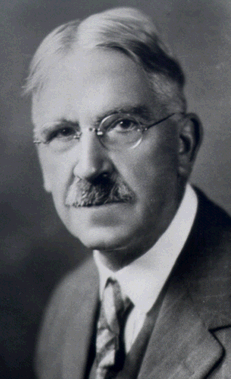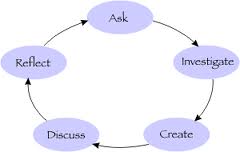Social Reforms of America: Early to Mid 19th Century
John Dewey
"Education is a social process. Education is growth. Education is, not a preparation for life; education is life itself." -John Dewey

John Dewey (October 20, 1859 – June 1, 1952) was an American philosopher, psychologist and educational reformer whose ideas have been influential in the education reform.
He studied the psychology of children, which sparked his interest in education and opened his eyes to the flaws in the education system.
“The child and the curriculum are simply two limits which define a single process. Just as two points define a straight line, so the present standpoint of the child and the facts and truths of studies define instruction” (Dewey, 1902, p. 16).
Dewey became a strong advocate for hands-on learning and experiential education, a philosophy that states education should be accomplished through direct experience with the learning environment and content.
His main concern of traditional classrooms was its lack of interaction and dull learning environment. He believed that the best way to learn is to personally interact with the curriculum.
"...If we put before the mind's eye the ordinary schoolroom, with its rows of ugly desks... we can reconstruct the only educational activity that can possibly go on in such a place. It is all made `` for listening" -- for simply studying lessons out of a book is only another kind of listening; it marks the dependency of one mind upon another. The attitude of listening means, comparatively speaking, passivity, absorption; that there are certain ready-made materials which are there, which have been prepared by the school superintendent, the board, the teacher, and of which the child is to take in as much as possible in the least possible time. "
--John Dewey. "The School and the Life of the Child," Chapter 2 in The School and Society.
He also said that:
“If knowledge comes from the impressions made upon us by natural objects, it is impossible to procure knowledge without the use of objects which impress the mind” (Dewey, 1916/2009, p. 217-218)
His educational theories were presented in My Pedagogic Creed (1897), The School and Society (1900), The Child and the Curriculum (1902), Democracy and Education (1916) and Experience and Education (1938).
His ideas for change were practical and beneficial to a child's learning process. For example:
He studied the psychology of children, which sparked his interest in education and opened his eyes to the flaws in the education system.
“The child and the curriculum are simply two limits which define a single process. Just as two points define a straight line, so the present standpoint of the child and the facts and truths of studies define instruction” (Dewey, 1902, p. 16).
Dewey became a strong advocate for hands-on learning and experiential education, a philosophy that states education should be accomplished through direct experience with the learning environment and content.
His main concern of traditional classrooms was its lack of interaction and dull learning environment. He believed that the best way to learn is to personally interact with the curriculum.
"...If we put before the mind's eye the ordinary schoolroom, with its rows of ugly desks... we can reconstruct the only educational activity that can possibly go on in such a place. It is all made `` for listening" -- for simply studying lessons out of a book is only another kind of listening; it marks the dependency of one mind upon another. The attitude of listening means, comparatively speaking, passivity, absorption; that there are certain ready-made materials which are there, which have been prepared by the school superintendent, the board, the teacher, and of which the child is to take in as much as possible in the least possible time. "
--John Dewey. "The School and the Life of the Child," Chapter 2 in The School and Society.
He also said that:
“If knowledge comes from the impressions made upon us by natural objects, it is impossible to procure knowledge without the use of objects which impress the mind” (Dewey, 1916/2009, p. 217-218)
His educational theories were presented in My Pedagogic Creed (1897), The School and Society (1900), The Child and the Curriculum (1902), Democracy and Education (1916) and Experience and Education (1938).
His ideas for change were practical and beneficial to a child's learning process. For example:
- maths could be learnt via learning proportions in cooking or figuring out how long it would get from one place to another
- history could be learnt by experiencing how people lived, geography, what the climate was like, and how plants and animals grew
However...
Even though his ideas had the potential to enhance the curriculum, if taken in moderation, Dewey, along with other education reformers of his time, often attempted radical changes and carried them to the extremes. They completely dismissed intellectual study and replaced it all with "real life experiences."
In 1898, Dewey wrote that systematic reading and writing instruction was rendered unnecessary by “the advent of quick and cheap mails, of easy and continuous travel and trans- portation, of the telegraph and telephone, the establishment of libraries,” and other changes.
This was frowned upon by most educators. However, without Dewey's reforms, classrooms might not be as interactive as they are today.
Even though his ideas had the potential to enhance the curriculum, if taken in moderation, Dewey, along with other education reformers of his time, often attempted radical changes and carried them to the extremes. They completely dismissed intellectual study and replaced it all with "real life experiences."
In 1898, Dewey wrote that systematic reading and writing instruction was rendered unnecessary by “the advent of quick and cheap mails, of easy and continuous travel and trans- portation, of the telegraph and telephone, the establishment of libraries,” and other changes.
This was frowned upon by most educators. However, without Dewey's reforms, classrooms might not be as interactive as they are today.
VIDEO!
This is a link to a video about John Dewey by Davidson films. It is a youtube video, so the link directly opens through a proxy.
This is a link to a video about John Dewey by Davidson films. It is a youtube video, so the link directly opens through a proxy.

